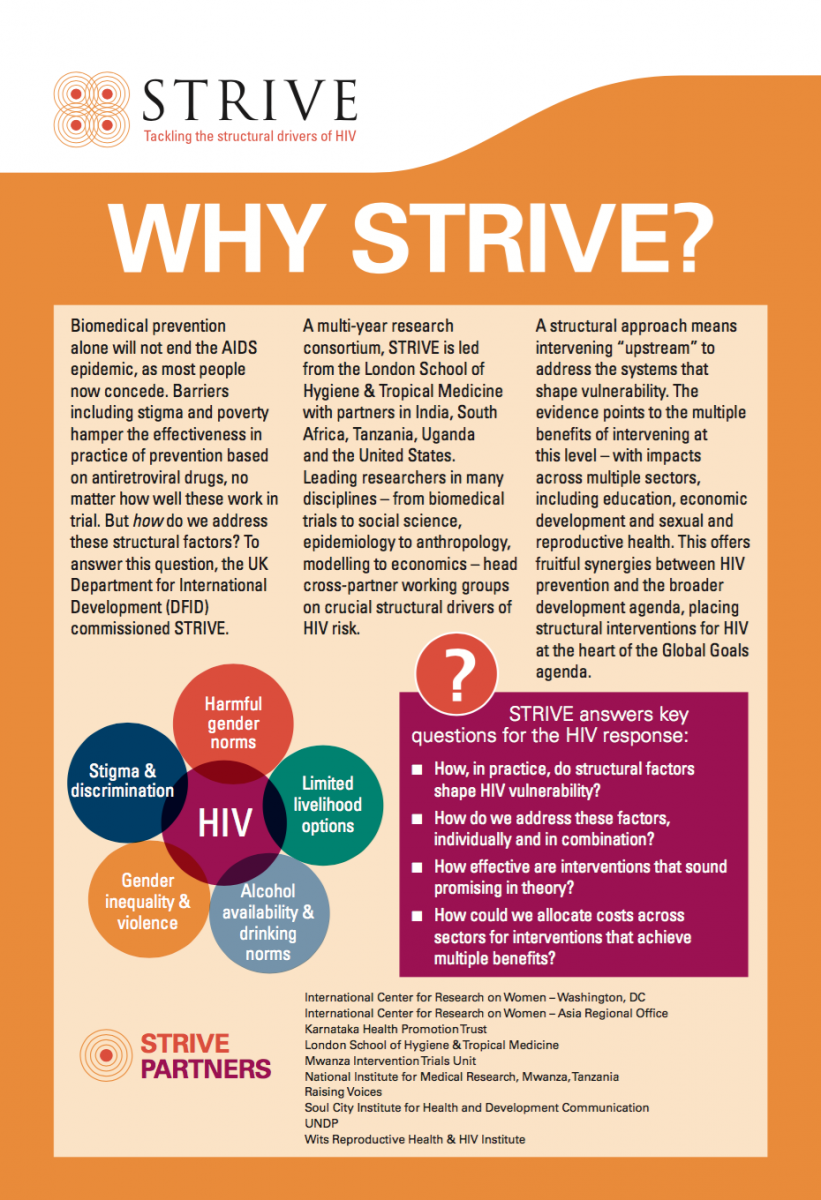In this session, STRIVE partner Soul City explains how their Phuza Wize initiative combined research, social mobilisation and alliance building to lobby for a public-health oriented alcohol policy in South Africa. Presenter Savera Kalideen describes:
Why STRIVE?
What does the STRIVE research consortium do, and why? What are the over-arching messages from STRIVE's research and analysis? And how can you access STRIVE activities, materials and learning?
Download the brochure to find the answers.

ASSHH UK Conference: 'Critical conversations about HIV'
On 20 June 2016 STRIVE co-hosted a one-day meeting with ASSHH UK, a network that aims to bring together UK-based researchers working on HIV in the humanities and social sciences. The meeting was organised by researchers from the London School of Hygiene & Tropical Medicine, University of Glasgow, University of Northampton, Goldsmiths and the School of Oriental and African Studies, with a small grant from the Wellcome Trust as well.
Validation of the MINI (DSM IV) tool for the assessment of alcohol dependence among young people in northern Tanzania using the alcohol biomarker phosphatidylethanol (PEth)
The alcohol dependence section of the Mini International Neuropsychiatric Interview questionnaire (MINI) has not been evaluated in young Africans. Research applied the MINI in a cross-sectional study of 202 alcohol users from northern-Tanzania, aged 18-24 years (103 male casual workers and 99 students) and validated it against phophatilylethanol (PEth) at a cut-off suggesting heavy chronic alcohol use.
Comparison of self-reported alcohol use with the alcohol biomarker phosphatidylethanol among young people in northern Tanzania
The one-month Time Line Follow Back Calendar (TLFB) and the Alcohol Use Disorders Identification Test (AUDIT) are both used to collect self-reported alcohol intake data. This paper compares these instruments with the alcohol biomarker phosphatidylethanol (PEth) among young people in northern Tanzania.
Sexual Risk Behavior, Alcohol Use, and Social Media Use Among Secondary School Students in Informal Settlements in Cape Town and Port Elizabeth, South Africa
South Africa’s HIV prevalence among young people remains among the highest in the world. A cross-sectional study was carried out in 2012 to estimate prevalences of sexual risk behaviour and hazardous alcohol use (HAU) (via the Alcohol Use Disorder Identification Test) as well as to investigate potential associations between these outcomes and social media use.
The epidemiology of alcohol use and alcohol use disorders among young people in northern Tanzania
Estimated alcohol use in this study was greater than the WHO estimates for Africa among young people.
Public Health vs Alcohol: An interview with Savera Kalideen
How has Soul City worked to shift alcohol regulations in South Africa?
GIS Mapping: Geographic Information System Workshop 2015
In a short video, STRIVE partners learn to use GIS to map alcohol outlets in three countries.



